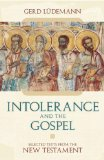Book Description
Tolerance or intolerance? Which of the two is promoted by the New Testament? And why?
Contemporary Christians usually suppose that Christianity is quite congenial to the democratic ideals that are the basis of free, open Western societies. Among these ideals is freedom of religion, which encourages a broad tolerance for different belief systems. Nonetheless, a careful examination of core Christian beliefs and the history of Christianity reveal little tolerance for thinking or acting outside the orthodox Christian tradition.
In this enlightening analysis of key New Testament texts, historian of early Christianity Gerd Lüdemann discusses the inherently intolerant attitude that has characterized monotheistic belief systems generally and Christianity in particular. As Lüdemann points out, Christianity evolved within the context of the pluralistic Roman Empire, which generally allowed separate belief systems as long as political allegiance to the Roman state was never questioned. Ironically, Christians inherited their essential intolerance from Judaism, whose first commandment is the expression of a jealous God: “I am the Lord your God … Thou shalt have no other gods before me.” After Christianity became the state religion of Rome, tolerance disappeared and did not reappear on the world stage until the European Enlightenment of the 18th century.
In addition to the discussion of these issues, Lüdemann presents a textual analysis in five chapters of some of the letters in the New Testament. In each case he translates the letter, presents textual commentary, and demonstrates how the text reflects Christian intolerance of heretics and nonbelievers.
In conclusion, Lüdemann suggests that attempts to harmonize Christianity with the democratic ideal of tolerance cannot really work because there is a logical contradiction between monotheism and Christology, on the one hand, and the core values of a pluralistic society, on the other.
Comment
“Tolerance or intolerance? Which of the two is promoted by the New Testament? And why? Only a close reading of the early sources can answer these questions. And only an independent expert can do this job. Lüdemann’s exegesis is impeccable, and the answer he comes up with is as straightforward as it is convincing: the representatives of the early church followed Jewish monotheists in their intolerance toward unbelievers and heretics. A fascinating book to read and to ponder.”
– Dr. BERNHARD LANG
Professor of Religious Studies, University of Paderborn
Germany Honorary Professor of Divinity, University of St. Andrews, UK
Editor of the International Review of Biblical Studies
“This fascinating and probing book shows tolerance and intolerance delicately balanced between theological inquiry and historical investigation regarding the New Testament … A solid and compelling piece of scholarship, the book often reads as an apologetic treatise, with Lüdemann engaging what he sees as an incongruousness between religious pluralism, which champions tolerance, and the biblical text, which is inherently intolerant … Certain to fire up debate, this work is recommended for theological and academic libraries.”
– LIBRARY JOURNAL
“With his customary detailed scholarship, Gerd Lüdemann traces quite convincingly the history of intolerance from its emergence in the monotheism and attendant concept of the Chosen People in the Old Testament and Judaism, through the New Testament, especially the Johannine and Deutero-Pauline Epistles, down through Christianity and Islam, to its devastating consequences in the political situations of today.”
– JAMES M. ROBINSON
Former Director of the Institute for Antiquity and Christianity
Professor Emeritus at Claremont Graduate University
“Christian theology has long prided itself on a gospel of love, forgiveness, respect and tolerance. Gerd Lüdemann, with his usual skill at marshalling evidence and reading documents contextually, alerts us to the fact that the modern democratic concept of tolerance would have been completely foreign to the New Testament writers; that Christian monotheism and the emerging belief in the divinity of Jesus promoted exclusion and conflict rather than social harmony; and that the epistolary tradition of the early church shows a growing tendency toward intolerance and slandering of those unwilling to sign onto the new religion. A much needed and indispensable study.”
– R. JOSEPH HOFFMANN, Chair
Committee for the Scientific Study of Religion
Senior Fellow, Center for Inquiry




